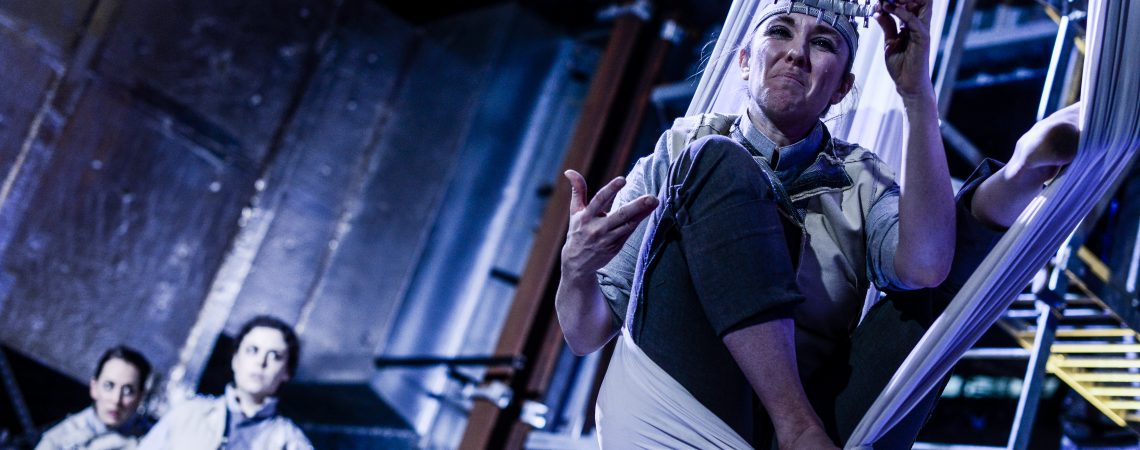
So a very close and dear old friend (old in our acquaintance not in his years) met me yesterday at the school gates and asked how my all-female Shakespeare project was going. I started to talk to him about the possibility of Comedy or Tragedy and the possibility of doing Richard III. He looked completely shocked. “What you don’t know what play you are doing yet?! But you’ve been rehearsing??!!” And there it was. He, unknowingly, had tapped into my fear. My insecurity. My paranoia. How dare I be so indulgent (my words, not his) as to use public money to simply develop an idea with no product at the end of it? No full-scale production? How dare I spend three months working full-time with actors, a designer, a marketing manager, stage management, movement directors, voice coaches and expert practitioners and have no show at the end of it?!
So for the record this is what I have been doing.
I held five day long open workshops for over 50 female actors who came from across Britain to work on Shakespearean texts. I had a hunch that it was something that was needed. The feedback was overwhelming. These workshops also acted as auditions so that I now have quite an amazing pool of actors to choose from when I come to go into rehearsal for the production in 2014. It also sparked the debate of why there is no Actors Centre in Wales.
I have been working with an ensemble of actors, drawn from the above workshops to explore the obstacles and opportunities of approaching a Shakespeare text with an all-female cast. (see earlier blog for why an all-female cast)
To do this I have brought in expert practitioners, movement specialists – Catherine Bennett (Volcano), Imogen Knight (Frantic Assembly) and an RSC recommended voice expert – Jacqui Crago and a Le Coq trained actor/director – Vanessa-Faye Stanley and will have worked with 10 actors across three weeks.
As part of this process we are also exploring which text would be the most powerful to a) use with an all-female cast and b)engage a non-traditional theatre going audience.
That is a big part of this project for me. I believe Theatre is for everybody and so is Shakespeare. How do we engage a traditionally non-theatre going audience? I am working with a great Marketing Manager (Alice Baynam) to explore that. We have been out on the streets on Cardiff with the ensemble getting people’s feedback. We are going into schools to talk to young people. We are working with venues in Cardiff to try and work out where to do this future production and maximise audience engagement. I am working with a designer (Gabriella Slade) on this also who is working with school children on costume design. I am also working with a young documentary film maker who is making a film of the process.
Who is benefitting? Well 50 actors have. So are nearly 20 people that I have created work for. So are about 50 young people who are engaged with a professional designer. And possibly some members of the general public who are being asked their opinion and being given a voice and as a result might, just might engage with a final production that they otherwise would never have done. Oh and me. I am benefitting as an artist in South Wales. I am being allowed to develop my practice.
And you know what, I’m going to say it…I think Wales’ Arts & Cultural scene is benefitting. I think it is about raising the bar. Who is producing Shakespeare here? Where is there another all-female company in Wales? Bringing in expert practitioners from outside Wales who work regularly at The RSC, The Royal National Theatre and nationally acclaimed companies such as Frantic Assembly can only be a good thing surely?
And all this takes time. Omidaze has no core funding. And so I got a grant. I have struggled with this from the moment the funding was secured and have to have a quiet word with myself on more than a daily basis for many reasons… I believe as a society:
- We are an increasingly product driven and capitalist society which constantly seeks financial justification for every activity and The Arts and The Artist are increasingly marginalised.
- We encourage less and less the development and exploration in the Arts
- Much production development funding in Wales is used to produce an actual show which I believe is to the detriment of the overall standard of work being produced here.
Now I have really put my head above the parapet and set myself up to fail and be judged. Lengthy production development does not always equal a brilliant final production. But it does allow us to develop, learn and grow as artists and that I believe is essential. Not just for the artist but for how we live.